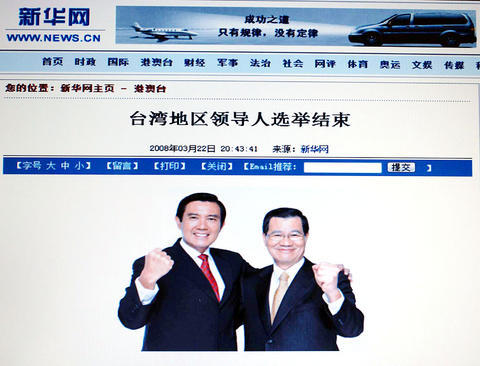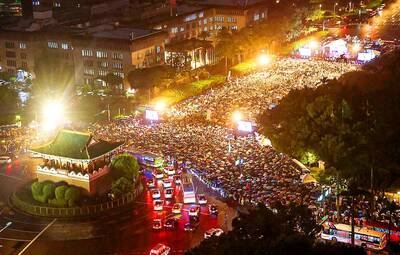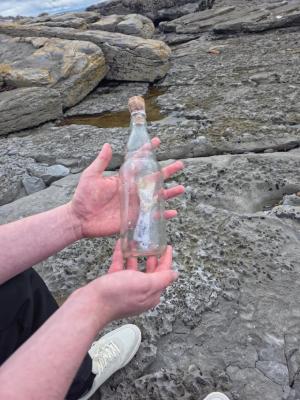The failed passage of both UN referendums in Saturday's election may have sent a message to the world that Taiwanese do not care about the country's admission to the UN, a group of foreign and local academics said yesterday during a roundtable in Taipei.
Calling the failed referendum a "miserable story," Gunter Shubert, from University of Tuebingen's Institute of Chinese and Korean Studies, said that not only was the collective will of Taiwanese falsely represented, but the referendum, as a political instrument, was "misused and degraded" in this election, as both camps used it to boost the interests of the party rather than to mirror what the people wanted.
Both referendums were also poorly formulated, he said.

PHOTO: CNA
The referendums proposed by the Democratic Progressive Party (DPP) and the Chinese Nationalist Party (KMT) on Taiwan's UN bid were held in tandem with the presidential election on Saturday.
The DPP called on voters to agree on Taiwan applying for a full UN membership under the name "Taiwan," while the KMT version asked for support for Taiwan to re-enter the body as the "Republic of China," or under any other "practical" titles.
The referendums failed as the 35 percent turnout fell short of the required threshold of more than 50 percent of eligible voters, even though the DPP proposal received a 94 percent "yes" vote and the KMT proposal was approved by 87 percent.
Aside from specialists and those who followed the matter closely, most people will likely equate the low turnout with lack of desire for membership in the global body, Shubert said.
If Taiwan continues to misuse referendums, he said, people will eventually start to lose faith in the tool.
Christopher Hughes, professor of international relations at the London School of Economics, said the Beijing government could spin the results and argue that the referendum defeat showed that most Taiwanese do not wish to be independent from China.
Shortly after the result was announced on Saturday night, Beijing's Taiwan Affairs Office released a statement saying the failed referendum meant that "the issue of independence has not won the heart of the Taiwanese people."
Asked if he believes Taiwan can recover from the setback, Hughes said: "The situation cannot be worse than it is right now," adding that Taiwan should develop better public relations strategies to win more support.
Lin Cheng-yi (
"If it had been the UN that conducted the referendum on Taiwan's membership, the result would have been overwhelmingly different," he said.
At a separate forum hosted by the Taiwan Foundation for Democracy yesterday, political observers said newly elected president Ma Ying-jeou (馬英九) needs to think hard about how he will explain the failure of the referendums to the rest of the world.
Lee Yeau-tarn (
"What is even more regrettable is that the result was interpreted in such a way that would make it appear that the referendums were voted down, which is not the case," Lee said.
Highlighting the problem of the threshold, Lee said, is the fact that "the legislature would have been an illegitimate institution if the 50 percent turnout was an appropriate threshold."
"A 35 percent turnout isn't that bad," Lee said, adding that in 2005, the turnout at the National Assembly on approving a constitutional reform package that determined a legislative reform proposal was 23 percent.

FINAL COUNTDOWN: About 50,000 attended a pro-recall rally yesterday, while the KMT and the TPP plan to rally against the recall votes today Democracy activists, together with arts and education representatives, yesterday organized a motorcade, while thousands gathered on Ketagalan Boulevard in Taipei in the evening in support of tomorrow’s recall votes. Recall votes for 24 Chinese Nationalist Party (KMT) lawmakers and suspended Hsinchu City mayor Ann Kao (高虹安) are to be held tomorrow, while recall votes for seven other KMT lawmakers are scheduled for Aug. 23. The afternoon motorcade was led by the Spring Breeze Culture and Arts Foundation, the Tyzen Hsiao Foundation and the Friends of Lee Teng-hui Association, and was joined by delegates from the Taiwan Statebuilding Party and the Taiwan Solidarity

Instead of threatening tariffs on Taiwan-made chips, the US should try to reinforce cooperation with Taiwan on semiconductor development to take on challenges from the People’s Republic of China (PRC), a Taiwanese think tank said. The administration of US President Donald Trump has threatened to impose across-the-board import duties of 32 percent on Taiwan-made goods and levy a separate tariff on semiconductors, which Taiwan is hoping to avoid. The Research Institute for Democracy, Society, and Emerging Technology (DSET), a National Science and Technology Council think tank, said that US efforts should focus on containing China’s semiconductor rise rather than impairing Taiwan. “Without

An SOS message in a bottle has been found in Ireland that is believed to have come from the Taiwanese captain of fishing vessel Yong Yu Sing No. 18 (永裕興18號), who has been missing without a trace for over four years, along with nine Indonesian crew members. The vessel, registered to Suao (蘇澳), went missing near Hawaii on Dec. 30, 2020. The ship has since been recovered, but the 10 crew members have never been found. The captain, surnamed Lee (李), is believed to have signed the note with his name. A post appeared on Reddit on Tuesday after a man

President William Lai (賴清德) today condemned an alleged attempt by two Chinese to snatch a letter of congratulations handed to Taiwan’s taekwondo team after they won silver at the Summer World University Games in Essen, Germany, yesterday. A Chinese man and woman reportedly tried to snatch a congratulatory letter to athletes Hung Jiun-yi (洪俊義), Jung Jiun-jie (鍾俊傑) and Huang Cho-cheng (黃卓乘) from the Ministry of Education, and then argued with media employees. “Why are you taking our things?” the media employees asked. “Does that say Chinese Taipei?” the two Chinese reportedly said. Following the incident, Sports Administration Director-General Cheng Shih-chung (鄭世忠) wrote on